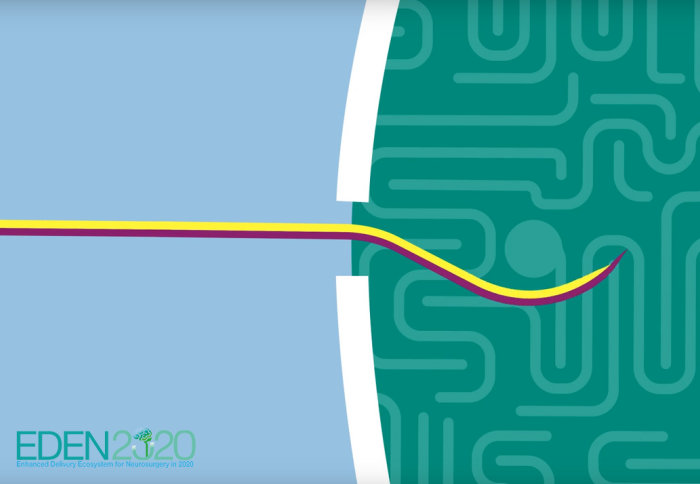EDEN2020 performs the very first live flexible needle insertion

EU-funded Horizon2020 research project, EDEN2020 performs first flexible catheter insertion
From an idea of wasp ovipositors and neurosurgery 13 years ago, to a EU-funded Horizon2020 research project, to now the world’s first flexible catheter insertion, EDEN2020 has come so far. We take a look at how far EDEN2020 has progressed from Professor Ferdinando Rodriguez y Baena’s chance dinner conversation, to an amazing consortium of EU research partners and the first successful trial.
On the 5 July 2019, EDEN2020 engineers and researchers successfully performed the world’s first live flexible needle insertion at Ospedale Veterinario Universitario (University Veterinary Hospital) in Lodi, Italy. The Enhanced Delivery Ecosystem for Neurosurgery (EDEN2020) is an €8.3 million project (2016-2020) funded by the European Union Horizon2020 programme, which aims to translate the latest surgical robotic technologies into patient-specific neurosurgical applications, meeting the demand for better and less invasive treatment in neurosurgery.
The team included representation from all consortium partners, with Dr Davide Zani (Universita' di Milano) leading the vet team, Dr Marco Riva (Universita' di Milano) as the lead neurosurgeon, Dr Antonella Castellano (Ospedale San Raffaele) responsible for imaging, Dr Thomas Wendler Vidal on Ultrasound, and Dr Riccardo Secoli and Dr Stefano Galvan (IMPERIAL) coordinating the process on the day.
So where did it all begin? Professor Rodriguez y Baena, of Imperial’s Department of Mechanical Engineering, some 13 years ago had a chance conversation about wood-boring wasps over dinner with close friend and colleague, Prof Julian Vincent. Rodriguez y Baena wondered whether the wasp’s curved ovipositor (stem like part of the wasp that lays eggs) could be mimicked in robotic medical technology to improve the delivery of treatments. Fast-forward to 2015, €8.3 million from the European Union was granted to lead a four-year project to develop a suite of robotic tools that would use the needle for drug delivery in neurosurgery.

Current methods during neurosurgery involve surgeons delivering medicine by inserting thin, unbending and hollow needles, aka cannulas into the brain. The rigid structure of the cannula means that it can only be inserted in a straight path with no adaptation to the changing nature of soft, deforming brain tissue. This method can lead to inaccurate placement of cannulas in the brain thus, increase risks for patients.
The advent of a cannula that is flexible and adaptable to the soft and malleable environment that is the brain, would allow surgeons to deliver more accurately life-saving medicinal therapies and provide patients a better recovery plan. With the EDEN2020 platform, the insertion of such a cannula can be done precisely and more delicately, benefiting applications ranging from drug delivery to deep brain stimulation.
This was a culmination of a mammoth effort from the EDEN2020 consortium who worked around the clock to enhance the system integration, coordinate trials and continue the painstaking fine-tuning. Despite the many setbacks and difficulties, the team pushed beyond to get to this point which, was a resounding success. EDEN2002’s coordinator, Professor Ferdinando Rodriguez y Baena describes what it means for him being part of this leap in surgical MedTech; “for me personally, this has been the culmination of a 13-year long wait, and a stark reminder of why I love my job as much today as I did when I first started: the privilege of working beyond the state of the art with some of the best scientists and clinicians available.”
“for me personally, this has been the culmination of a 13-year long wait, and a stark reminder of why I love my job as much today as I did when I first started: the privilege of working beyond the state of the art with some of the best scientists and clinicians available.” Professor Ferdinando Rodriguez y Baena Department of Mechanical Engineering, Imperial College London
There are many clinical and patient benefits moving forward and beyond EDEN2020. Not only will the surgical robotic system minimise invasive surgery, ultimately improving outcomes and recovery times for patients, but it will also be able to gather information on brain anatomy and deliver with unmatched accuracy life-saving cancer therapy to what was once before inaccessible areas of the brain. Further, while the initial focus is on precision delivery of cancer therapy, it is not hard to envisage the surgical system’s application beyond into other medical treatment plans.
For more information about the EDEN2020 project, go the EDEN2020 website and follow EDEN2020 on Twitter and Facebook.
Article text (excluding photos or graphics) © Imperial College London.
Photos and graphics subject to third party copyright used with permission or © Imperial College London.
Reporter
Siobhan Markus
Enterprise